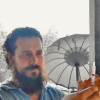
Animal scientist. PhD. Vet micro. Gram -ve bacteria, AMR, zoonoses & bioinformatics. Disabled cPTSD, ABI & ASD. Animal lover. Spoonie. Enby. Pan. Aceflux. I am almost always carrying dog treats and scented stickers on me.
This profile is from a federated server and may be incomplete. Browse more on the original instance.
